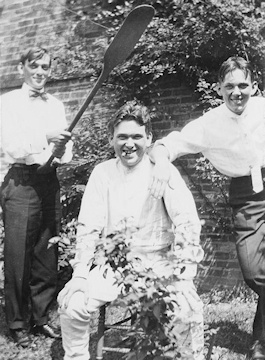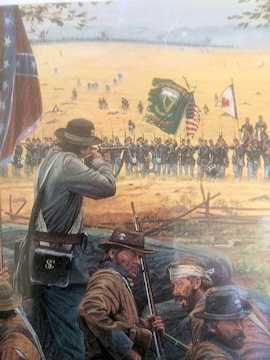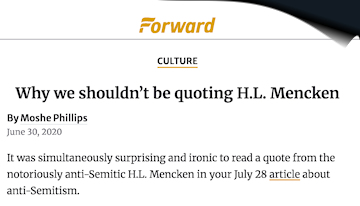
In the previous post I quoted from one of my life-long inspirations, Henry Louis Mencken, considered the most influential American literary critic in the 1920s and, indeed, for many years thereafter.
In honor of his birth 145 years ago this Friday, I would like to linger a moment longer over his grave to pay my respects. This is not meant to be a complete survey of his works, nor a comprehensive biography. Both can easily be found on the internet. Instead, I simply want to introduce him to those who are perhaps unfamiliar with H.L. Mencken, and refresh the memory of those who are. Readers of this blog will surely note his influence here. I was introduced to the writings of Mr. Mencken by my father, which gives you some idea of the type of household I grew up in.
As one would expect when considering the works of a prolific writer whose career spanned over fifty years, the average reader will find a great deal with which he agrees, and perhaps even more with which he does not. Like all living things, writers change over time. In way, that is a fair summary of H.L. Mencken’s work: his rapier wit slashed back and forth, left or right. His views on race may have changed somewhat over time, but his targets were always hypocrisy, boorishness, and stupidity, and it didn’t matter on whose back the target was painted. He was the original curmudgeon, often imitated but never equaled. In our time of “cancel culture”, partisan censorship, and extreme media bias, his writings are refreshing, entertaining, and relevant, recalling a time when men said what they wanted to say and let the chips fall where they may. And frankly, they are fun to read.
I’m going to get out of the way and let him speak for himself. But first, a little background for context.

1887
Henry Louis Mencken was born September 12, 1880 to a German-American family in Baltimore and grew up speaking German. His father, August Mencken Sr., was no less a character: Owner of a cigar factory, in 1889 the Baltimore local Cigar Makers’ International Union called a strike. The union did not have the funds to pay full benefits to members; the best it could manage was the $2.10 cost of a ticket to Philadelphia, which had so many cigar shops at the time that it was known as the Cigarmaker’s Heaven. The only proof that it required of a candidate’s profession were the tools of the trade: a boxwood cutting-board and cutting tools. The anti-union Mencken acquired a large quantity of the tools, rounded up a large number of drunks and tramps, gave them a shot of whiskey and a set of the tools, and sent them to Union headquarters for their tickets. In the course of a few weeks, according to Mencken himself, “at least a thousand poor bums were run through the mill.” The union went broke and was effectively destroyed, and the strike was broken.
Interestingly, the Mencken family originally came from Oldenburg, Germany and had deep roots there. An Anastasius Ludwig Mencken worked as a political advisor to Frederick the Great; his daughter Wilhelmine Luise was the mother of the Reichskanzler Otto von Bismarck. There is still a street named Menckestraße in Leipzig today. In the event, H.L.’s grandfather, Burkhardt Ludwig Mencken, emigrated to America in 1848.
Growing up, Mencken was inspired to become a writer after reading Twain’s Huckleberry Finn, which he described as “the most stupendous event in my life”.
He read voraciously. In one winter while in high school he read William Thackeray and then “proceeded backward to Addison, Steele, Pope, Swift, Johnson and the other magnificos of the Eighteenth century”. He read the entire canon of Shakespeare and became an ardent fan of Rudyard Kipling and Thomas Huxley.
This last, Thomas Huxley, is of particular interest, as Huxley was an English biologist and anthropologist who specialized in comparative anatomy. He has since become known as “Darwin’s Bulldog” for his advocacy of Charles Darwin’s theory of evolution.

1906
Mencken also praised the works of Joseph Conrad, one of my favorite authors, and was an ardent admirer of Ambrose Bierce’s The Devil’s Dictionary, a copy of which has rested on my nightstand for thirty years just in case I need a quick smirk before lights-out. Is it any wonder I feel an affinity for Mencken?
After the death of his father, and having little interest in the production and selling of cigars, he became a full-time journalist in 1899 eventually landing at the Baltimore Sun, where he contributed editorials and opinion pieces for most of his career.
His quick, biting rhetoric soon set him apart from his contemporaries: Mencken savaged politics, hypocrisy, and social convention. Nothing was beneath being caught in the crosshairs of his wit: He once disdained the lowly hot dog bun’s descent into “the soggy rolls prevailing today, of ground acorns, plaster of Paris, flecks of bath sponge and atmospheric air all compact.” He defined Puritanism as “the haunting fear that someone, somewhere, may be happy”, and believed that the U.S. had not cast aside the Puritans’ influence.
He also believed that American culture, unlike its European counterparts, had not attained intellectual freedom, and judged literature by moral orthodoxy and not by artistic merit. We see this playing out now in the difficulty White male writers have getting published, unless they are gay, as noted in a previous blog entry and podcast dated April 1, 2025. Nor was the average reader above reproach: he noted that striving for objective news reporting was pointless as “[the] truth is a commodity that the masses of undifferentiated men cannot be induced to buy” and added a humorous description of how “Homo Boobus”- modern man- like all “higher mammalia”, is moved by “whatever gratifies his prevailing yearnings”. Insight indeed.

Again, this is merely a sampling of his work: His papers at the New York public library alone run 48 linear feet in 120 boxes, 7 slipcases, and 69 microfilm reels. He is perhaps best known for his coverage of the Scopes “Monkey Trials“. But for our purposes, I want to focus on his views regarding race relations, the media, and the average American and their government. What I find both interesting, and perhaps sad and frightening at the same time, is how relevant what he wrote one hundred years ago still is today.
But that may be the point, really. We are raised to believe in progress; that each generation strives to achieve more and be greater than the generation before it. We are the moderns; they are the primitives. But human nature doesn’t change that fast, even if what passes for politically correct seems to change day-by-day.
Typically, if one encounters H.L. Mencken today, it is in the form of single sentences or one-off quips. This is a shame, as he wrote whole articles and several books; I think longer quotes pack more punch and are certainly more representative of his life’s work. With that contextual information out of the way, here are some examples of H.L. Mencken for your consideration. I suggest reading these with current events in mind.
“The American people, true enough, are sheep. Worse, they are donkeys. Yet worse, to borrow from their own dialect, they are goats. They are thus constantly bamboozled and exploited by small minorities of their own number, by determined and ambitious individuals, and even by exterior groups. The business of victimizing them is a lucrative profession, an exact science, and a delicate and lofty art. It has its masters and it has its quacks. Its lowest reward is a seat in Congress or a job as a Prohibition agent, i.e., a licensed blackleg; its highest reward is immortality. The adept practitioner is not only rewarded; he is also thanked.” –Notes on Democracy, 1926

“Ask the average American what is the salient passion in his emotional armamentarium—what is the idea that lies at the bottom of all his other ideas—and it is very probable that, nine times out of ten, he will nominate his hot and unquenchable rage for liberty. He regards himself, indeed, as the chief exponent of liberty in the whole world, and all its other advocates as no more than his followers, half timorous and half envious. … The American of today, in fact, probably enjoys less personal liberty than any other man of Christendom, and even his political liberty is fast succumbing to the new dogma that certain theories of government are virtuous and lawful and others abhorrent and felonious. Laws limiting the radius of his free activity multiply year by year: it is now practically impossible for him to exhibit anything describable as genuine individuality, either in action or in thought, without running afoul of some harsh and unintelligible penalty. It would surprise no impartial observer if the motto, In God we trust, were one day expunged from the coins of the republic by the Junkers at Washington, and the far more appropriate word, Verboten, substituted. Nor would it astound any save the most romantic if, at the same time, the goddess of liberty were taken off the silver dollars to make room for a bas relief of a policeman in a spiked helmet.” The American Credo, 1920
Interesting how it also applies to Great Britain at the moment.
Again, consider the following in light of the current state of affairs in America, particularly the recent Democratic sponsored open-border invasion of this country during the last administration:
The great problem ahead of the United States is that of reducing the high differential birthrate of the inferior orders, for example, the hillbillies of Appalachia, the gimme farmers of the Middle West, the lintheads of the South, and the Negroes. So far no rational effort to grapple with it has been made. On the contrary, the prevailing political mountebanks have sought to put down a discussion of it as immoral: their aim has been to prosper and increase the unfit as much as possible, always at the cost of the fit. But this can’t go on forever, else we’ll have frank ochlocracy [mob rule] in America, and the progress of civilization will be halted altogether. The theory that inferior stocks often produce superior individuals is not supported by any known scientific facts. All of them run the other way.” – Minority Report: H. L. Mencken’s Notebooks, 1956
…the low-class blacks who formed part of the war-time immigration show no sign of returning home. They find life in Baltimore much pleasanter than it was in their native wilds, and when hard times come again they will all go on the dole. The city jail is already full of them, and four or five are in the death-house. ” -Diary of H.L. Mencken, p. 397

Hollins St., Baltimore, 1929
Now, to be fair, Mencken, as should be obvious from the Minority Report quote above, was a Yankee through and through, and had little regard for anything south of the Potomac or west of Baltimore. As a great many of my ancestors fought in the Georgia regiments during the War of Northern Aggression, I simply have to take Mencken as he is, Yankee warts and all. But that doesn’t diminish his writing to my mind. As I said, his rapier wit cut both ways. Here is an example: No fan of lynching and holding the Klu Klux Klan in high contempt, he nevertheless slashed the hypocrisy found in the North, hoisting them on their own petard:
Not a single solitary sound reason has yet been advanced for putting the Ku Klux Klan out of business. If the Klan is against the Jews, so are half of the good hotels of the Republic and three-quarters of the good clubs. If the Klan is against the foreign born or the hyphenated citizen, so is the National Institute of Arts and Letters. If the Klan is against the Negro, so are all of the states south of the Mason-Dixon line. If the Klan is for damnation and persecution, so is the Methodist Church. If the Klan is bent upon political control, so are the American Legion and Tammany Hall. If the Klan wears grotesque uniforms, so do the Knights of Pythias and Mystic Shriners. If the Klan holds its meetings in the dead of night, so do the Elks. If the Klan conducts its business in secret, so do all college Greek letter fraternities and the Department of State. If the Klan holds idiotic parades in the public streets, so do the police, the letter-carriers, and firemen. If the Klan’s officers bear ridiculous names, so do the officers of the Lambs’ Club. If the Klan uses the mails for shaking down suckers, so does the Red Cross. If the Klan constitutes itself a censor of private morals, so does the Congress of the United States. If the Klan lynches a Moor for raping someone’s daughter, so would you or I.” – The Smart Set, 1923
And though, as noted, he had little patience with the South, he acknowledged the fundamental hypocrisy of the Union cause:
Note on the Gettysburg Address
by H.L. Mencken
The Gettysburg speech was at once the shortest and the most famous oration in American history…the highest emotion reduced to a few poetical phrases. Lincoln himself never even remotely approached it. It is genuinely stupendous. But let us not forget that it is poetry, not logic; beauty, not sense. Think of the argument in it. Put it into the cold words of everyday. The doctrine is simply this: that the Union soldiers who died at Gettysburg sacrificed their lives to the cause of self-determination – that government of the people, by the people, for the people, should not perish from the earth. It is difficult to imagine anything more untrue. The Union soldiers in the battle actually fought against self-determination; it was the Confederates who fought for the right of their people to govern themselves.”

However, it is his assessment of the historiography of World War II that has most resonated with me recently as the so-called “Greatest Generation” dies off and the Jewish publishing houses try desperately to prevent the growing tide of historical reassessment of the conflict’s true causes and consequences.
“The true history of World War II, like that of World War I, will probably never be written. The professional historians, as usual, will swallow the official doctrine, which is palpably false. They will take every scrap of official document seriously, and even accept with gravity the reports of the newspapers. It is not hard for a man of reasonable intelligence to get some glimpses of the process by which the United States was hauled into the war, but there are great gaps in the record, and it is not to the interest of anyone concerned to fill them. All that can be established with fair certainty is that no account of the matter by Roosevelt II and his followers will be even so much as half true.” – Minority Report: H. L. Mencken’s Notebooks, 1956

I have shared all of this for several reasons: First, to honor the man who made it his life’s mission to puncture the puffed-up world of the false elite: those who think themselves better than the common man while actually being nothing more than well-heeled, self-serving troglodytes; challenging his readers to think for themselves; and to say what needed to be said, never bowing to the politically correct winds of the day. Frankly, that would be a good mission statement for this or any other self-respecting blog or podcast.

Second, it is also a nod to my father who introduced me to H.L. Mencken’s writings. He is an old man now and starting to fade, and I wanted to acknowledge his contribution to my life’s education before before the opportunity to do so has passed.
Thirdly, and perhaps more to our National Socialist purposes, I wanted to show the “larger picture”. As I said, the fundamental nature of people does not change quickly, if at all. The headlines we read today on X are surprisingly similar to what we would have read a hundred years ago in the newspaper. As such, the insights offered and the critique of our society is as relevant now as it was then. Change a few names here, a few dates there, and we could be reading about BLM marches, Covid restrictions, illegal migrations, absurd “science” where men can be women, and the continued lies regarding the Allies in WWII and their Jewish handlers. In short, it is a reminder to all that we are in a long, protracted struggle. Hang in there.
What has been will be again, what has been done will be done again; there is nothing new under the sun.

Lastly, in 1989 his diary was published, and it was discovered that, public image and writings aside, he was extremely pro-German and generally antisemitic. Indeed, I was delighted to see an article in the Jewish webzine Forward by Moshe Phillips complaining that a writer some weeks earlier had quoted Mencken, advising Jewish writers not to do so in the future as he was clearly, if privately, antisemitic. I consider this high praise and worthy of note, advising everyone to quote H.L. Mencken whenever and wherever possible as, evidently, it annoys the Jews.
H.L. Mencken was a breed apart. The champion of the self-evident, he was not above self-deprecation. Frankly, I suspect he would be the last person to enjoy this tribute. So, once again, I’ll defer to him: Although it does not appear on his tombstone, Mencken, early in his career, wrote a joking epitaph for himself:
If, after I depart this vale, you ever remember me and have thought to please my ghost, forgive some sinner and wink your eye at some homely girl.
H.L. Mencken died in Baltimore on January 29, 1956.
Thank you for your indulgence.
Amerika Erwache!
SUBSCRIBE TO THIS BLOG
(It’s free, and mostly painless)
Sources and Links:
The Diary of H.L. Mencken
Books by H.L. Mencken on Project Gutenberg
The F.B.I.’s files on Mencken (because of course they did)
Minority Report: H.L. Mencken’s Notebooks
“The urge to save humanity is almost always a false front for the urge to rule.”
– H.L. Mencken


Leave a Reply